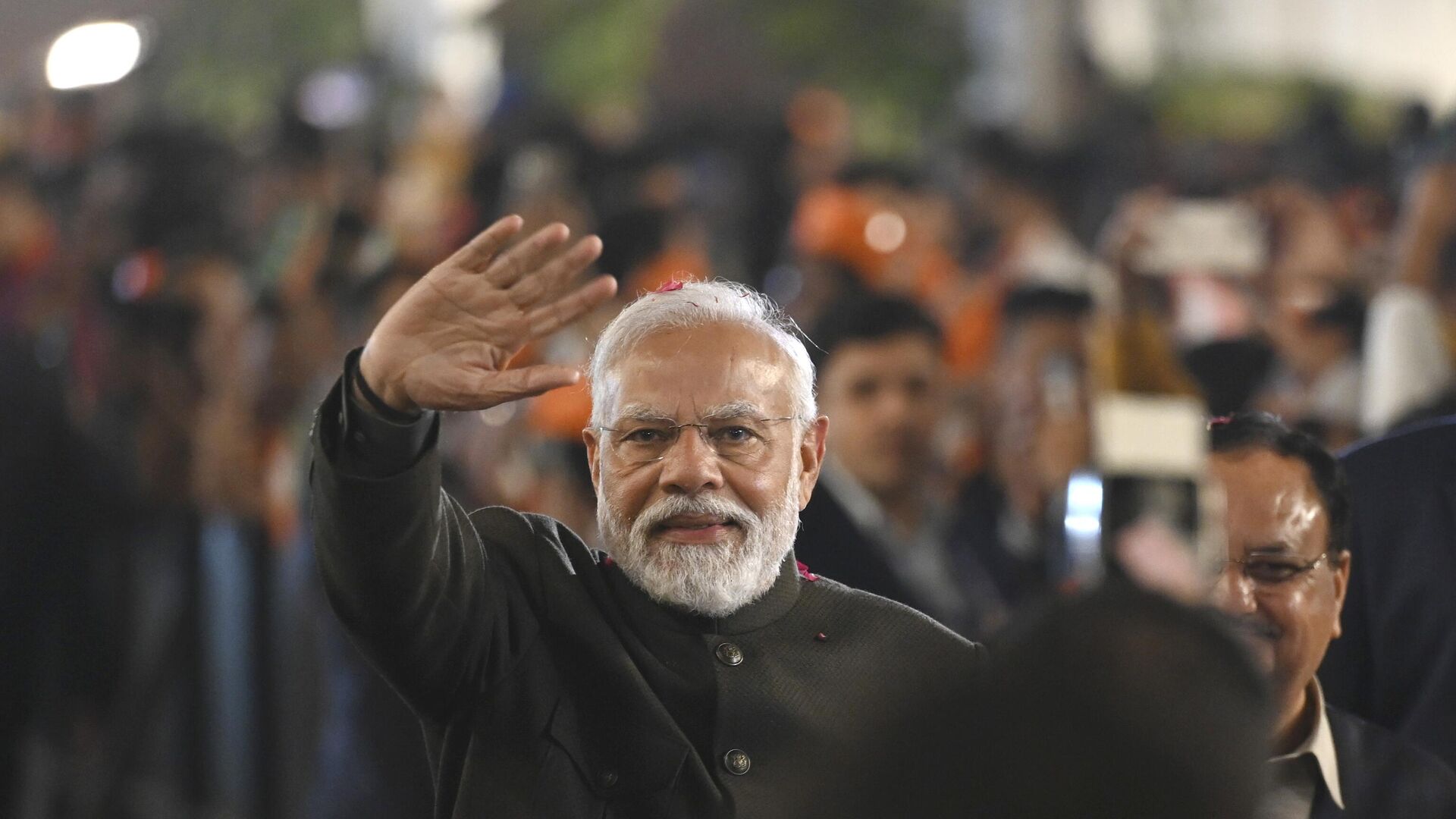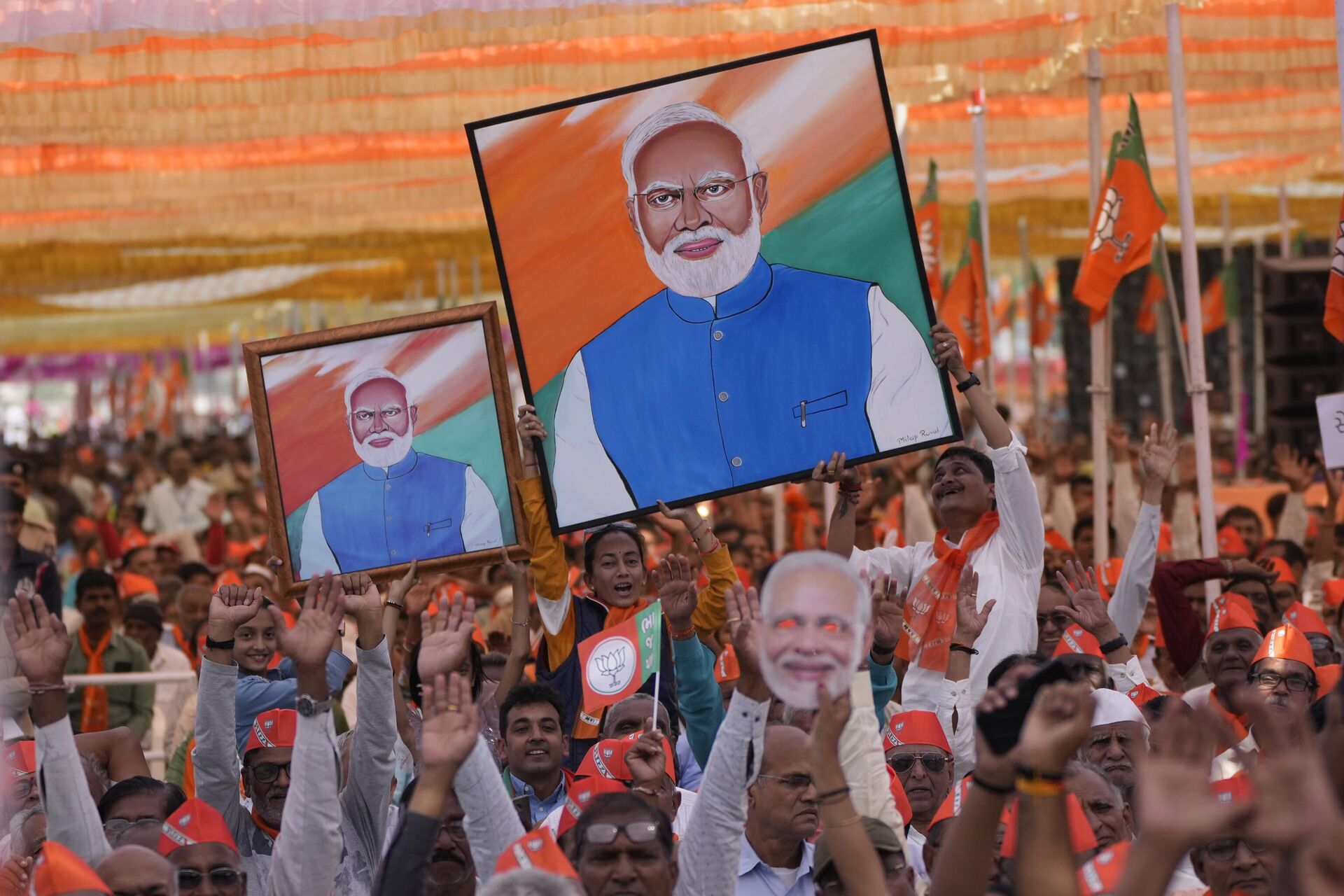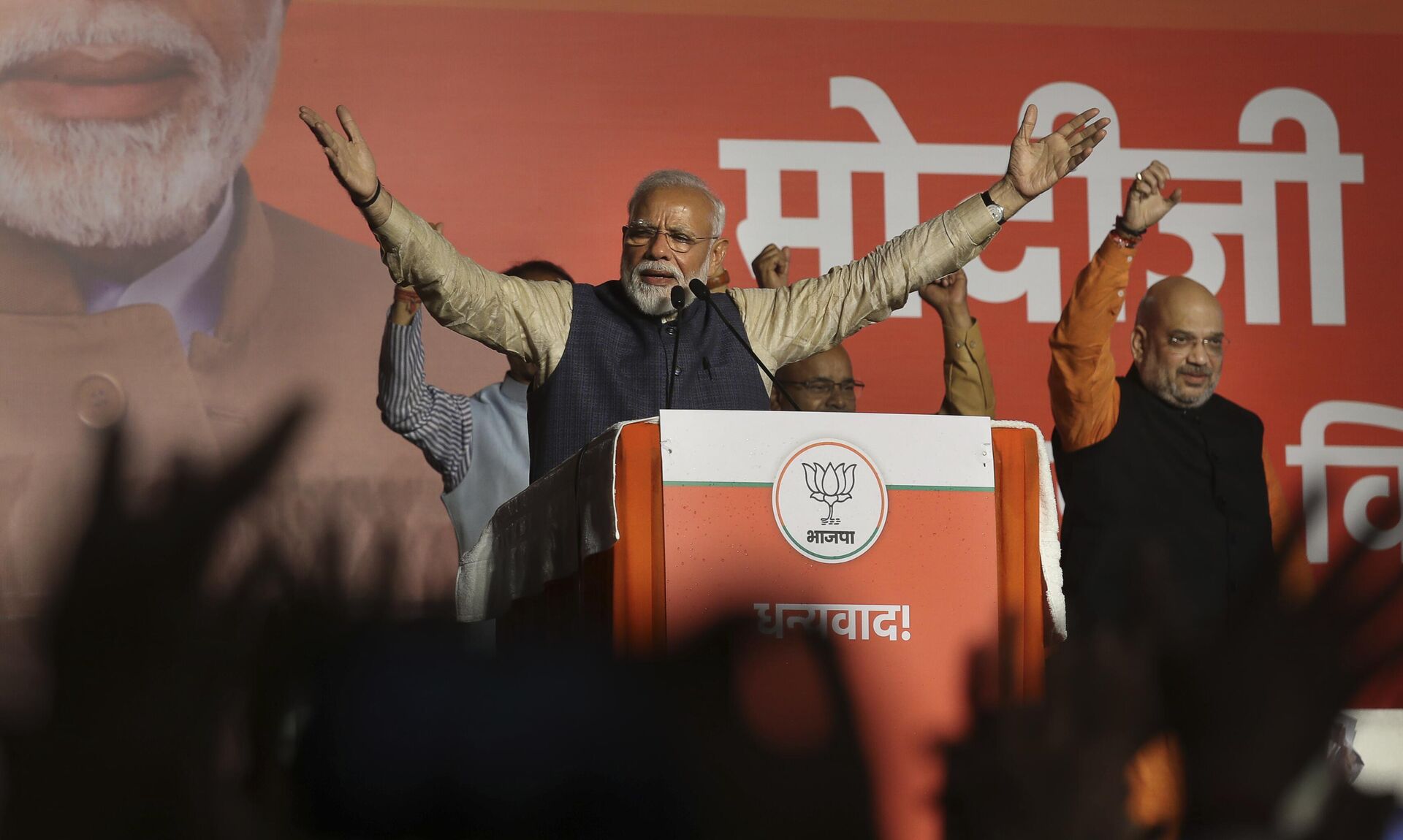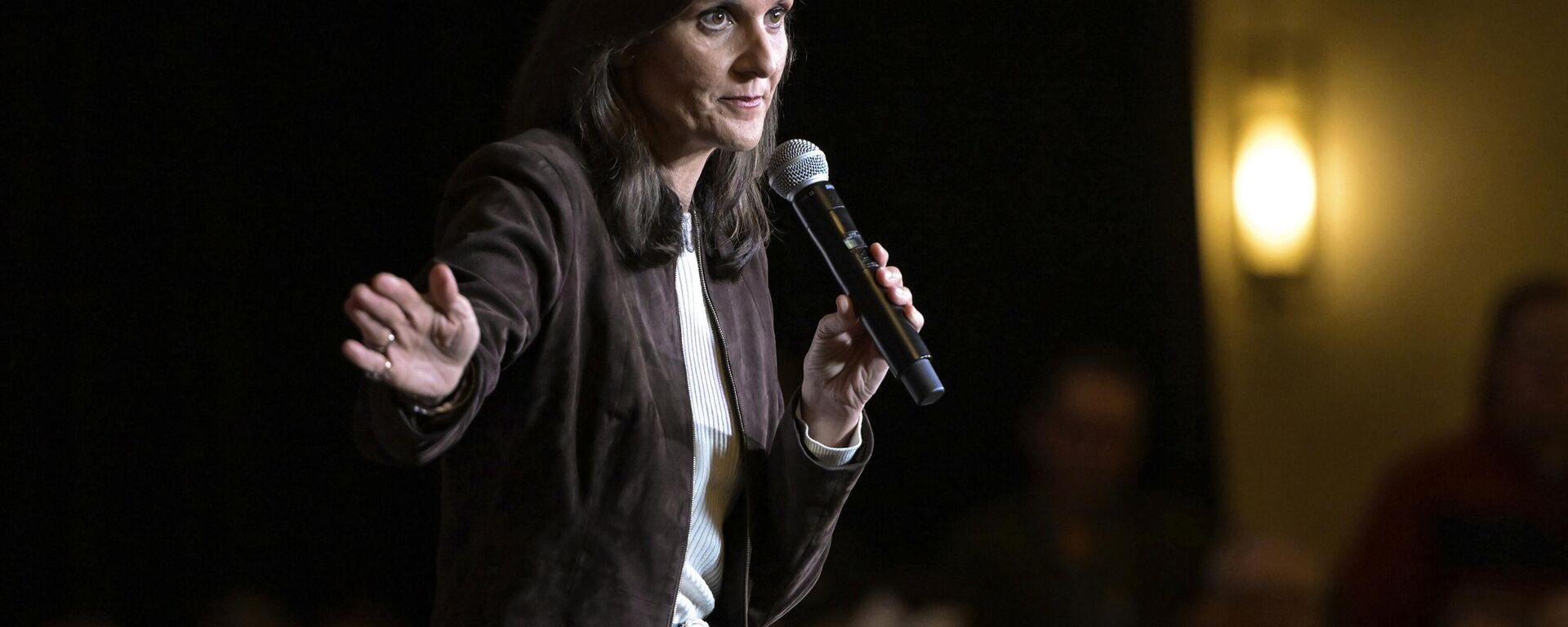https://sputniknews.in/20240217/us-uncomfortable-with-strong-mandate-for-modi-in-upcoming-election-6576965.html
US Uncomfortable with Strong Mandate for Modi in Upcoming Election
US Uncomfortable with Strong Mandate for Modi in Upcoming Election
Sputnik India
During a speech in Parliament this month, Prime Minister Modi expressed confidence that his Bharatiya Janata Party (BJP)-led coalition would win its highest tally of 400 seats in the upcoming election.
2024-02-17T11:26+0530
2024-02-17T11:26+0530
2024-02-17T11:26+0530
narendra modi
india
us
new delhi
bharatiya janata party (bjp)
bbc
popular front of india (pfi)
russia
western sanctions
westernization
https://cdn1.img.sputniknews.in/img/07e7/0c/06/5732324_0:160:3072:1888_1920x0_80_0_0_31b6addec2d9801740b52a69262443f2.jpg
The US-led collective west is against a "strong and nationalist" Prime Minister like Narendra Modi and has been viewed as "trying to undermine" his electoral prospects through the use of media narratives and criticism of New Delhi on its foreign policy and human rights, according to an Indian expert."They would like to have a weak Prime Minister in India, who would be subservient to their interests,” Bhagwat reckoned.He predicted the tactics of western media would be "counterproductive" and would instead undermine the credibility of western media and western governments in the eyes of the Indian public.He, however, remarked that the US has to get used to the "new normal in its dealings with India".Western Media's Coverage of India During Modi's Second TermThe western media has been at the forefront of criticising some of the key decisions of the Indian Prime Minister since he won his second term in 2019. On the other hand, the BJP has asserted that these decisions have contributed to Modi's popularity.In 2019, the Indian Parliament abrogated the Article 370 of the Indian Constitution, thereby annulling the semi-autonomous status of erstwhile state of Jammu and Kashmir. Large sections of Indian public have hailed the decision. But western media coverage of the events in Kashmir remains biased against Modi."A living hell of anger and fear," exclaimed an article by New York Times in 2019.India's decision to double down on its historical and strategic ties with Russia have irked western leaders, with the criticism trickling to the media narrative.On the human rights front, the western media has gone to the extent of calling Modi an "authoritarian"."The US and its allies are cultivating India as an economic and diplomatic partner. But its prime minister’s authoritarian streak is becoming harder to ignore," The Economist said last year. Last year, the BBC broadcast a documentary on Modi's alleged role in the 2002 Gujarat riots. India called the documentary as a piece of "propaganda".Last month, Modi presided over the inauguration of Ram Temple, thus bringing closure to one of the most divisive issues of Indian polity since independence.Washington Post described the event as the unveiling of the road map to "Hindu supremacy", while CNN called it as a "dark day for India's religious minorities".He further warned that certain sections of Indian opposition could play into the hands of western media as one neared the election.Bhagwat said that the Indian opposition's "hate" for PM Modi and the BJP has surged to an extent that they were collaborating with “western agents” to undermine India's global image.Western Media Undermining India-West RelationsBinay Kumar Singh, a strategic affairs expert at BJP-linked think tank Dr Syama Prasada Mookerjee Research Foundation (SPMRF), told Sputnik India that there were "two visions of India in front of us".He accused the western media of "spoiling ties between New Delhi and the West"."The western media has a bias against India because they have an agenda, driven by a colonial mindset of still seeing India as a colony," Singh said, adding that western media and the western governments were two distinct entities with mostly differing and sometimes convergent outlooks towards India.
https://sputniknews.in/20240208/india-lacks-trust-in-us-prioritizes-strategic-alignment-with-russia-nikki-haley-6483103.html
india
us
new delhi
russia
jammu and kashmir (j&k)
united kingdom (uk)
gujarat
ram temple
Sputnik India
feedback.hindi@sputniknews.com
+74956456601
MIA „Rossiya Segodnya“
2024
Dhairya Maheshwari
https://cdn1.img.sputniknews.in/img/07e6/0c/13/138962_0:0:641:640_100x100_80_0_0_2cb44360dbcdf6d84bf4b299cd045917.jpg
Dhairya Maheshwari
https://cdn1.img.sputniknews.in/img/07e6/0c/13/138962_0:0:641:640_100x100_80_0_0_2cb44360dbcdf6d84bf4b299cd045917.jpg
News
en_IN
Sputnik India
feedback.hindi@sputniknews.com
+74956456601
MIA „Rossiya Segodnya“
Sputnik India
feedback.hindi@sputniknews.com
+74956456601
MIA „Rossiya Segodnya“
Dhairya Maheshwari
https://cdn1.img.sputniknews.in/img/07e6/0c/13/138962_0:0:641:640_100x100_80_0_0_2cb44360dbcdf6d84bf4b299cd045917.jpg
modi news, modi uae visit, india us relations, khalistan referendum, pannun assassination plot, russian oil exports, russian crude exports to india, indian economy, amrit kaal, vikasit bharat 2047, developed india, kashmir news, article 370, ram temple inauguration, 2024 elections, opinion polls india, india russia relations
modi news, modi uae visit, india us relations, khalistan referendum, pannun assassination plot, russian oil exports, russian crude exports to india, indian economy, amrit kaal, vikasit bharat 2047, developed india, kashmir news, article 370, ram temple inauguration, 2024 elections, opinion polls india, india russia relations
US Uncomfortable with Strong Mandate for Modi in Upcoming Election
During a speech in Parliament this month, Prime Minister Modi expressed confidence that his Bharatiya Janata Party (BJP)-led coalition would win its highest tally of 400 seats in the upcoming election.
The US-led collective west is against a "strong and nationalist" Prime Minister like Narendra Modi and has been viewed as "trying to undermine" his electoral prospects through the use of media narratives and criticism of New Delhi on its foreign policy and human rights, according to an Indian expert.
"The western mainstream media, backed by few vested interests, is definitely against a strong, assertive and nationalist Prime Minister like Narendra Modi. I would also argue that the western nations wouldn't be comfortable with a strong mandate like a two-thirds majority for Prime Minister Modi's Bharatiya Janata Party (BJP) in the upcoming national election," Dr Anant Bhagwat, a member of Rashtriya Swayamsevak Sangh (RSS) and the chair of national security think tank Global Strategic Policy Foundation Pune (GSPFP), told Sputnik India.
"They would like to have a weak Prime Minister in India, who would be subservient to their interests,” Bhagwat reckoned.
He predicted the tactics of western media would be "counterproductive" and would instead undermine the credibility of western media and western governments in the eyes of the Indian public.
"A coalition government with several power centres or even a weak government with a reduced majority would be much more
amenable to western manipulation. The US understands that clearly," Bhagwat said.
He, however, remarked that the US has to get used to the "new normal in its dealings with India".
"India under PM Modi will firmly pursue its own national interest and won't be daunted by any external pressure whatsoever, including from the US. The US and the western powers are yet to fully come to terms with India's rise under Modi," said Bhagwat.
Western Media's Coverage of India During Modi's Second Term
The western media has been at the forefront of criticising some of the key decisions of the Indian Prime Minister since he won his second term in 2019. On the other hand, the BJP has asserted that these decisions have contributed to Modi's popularity.
In 2019, the
Indian Parliament abrogated the Article 370 of the Indian Constitution, thereby annulling the semi-autonomous status of erstwhile state of Jammu and Kashmir. Large sections of Indian public have hailed the decision. But western media coverage of the events in Kashmir remains biased against Modi.
"A living hell of anger and fear," exclaimed an article by New York Times in 2019.
India's decision to double down on its historical and strategic ties with Russia have irked western leaders, with the criticism trickling to the media narrative.
On the
human rights front, the western media has gone to the extent of calling Modi an "authoritarian".
"The US and its allies are cultivating India as an economic and diplomatic partner. But its prime minister’s authoritarian streak is becoming harder to ignore," The Economist said last year.
Last year, the BBC broadcast a documentary on Modi's alleged role in the 2002 Gujarat riots. India called the documentary as a piece of "propaganda".
Last month, Modi presided over the
inauguration of Ram Temple, thus bringing closure to one of
the most divisive issues of Indian polity since independence.
Washington Post described the event as the unveiling of the road map to "Hindu supremacy", while CNN called it as a "dark day for India's religious minorities".
Bhagwat predicted that such negative coverage of India would further "intensify" as New Delhi surges ahead on its goal to become a superpower by 2047.
He further warned that certain sections of Indian opposition could play into the hands of western media as one neared the election.
Bhagwat said that the Indian opposition's "hate" for PM Modi and the BJP has surged to an extent that they were collaborating with “western agents” to undermine India's global image.
"They haven't been able to digest the electoral success and unbreachable popularity of Modi and the BJP. And now, they are resorting to what may be termed as anti-India activities," the Indian expert stated.
Western Media Undermining India-West Relations
Binay Kumar Singh, a strategic affairs expert at BJP-linked think tank Dr Syama Prasada Mookerjee Research Foundation (SPMRF), told Sputnik India that there were "two visions of India in front of us".
"Last year, Indian anti-terror agencies seized a document titled 'India 2047-Towards the Rule of Islam in India' from a banned terrorist group Popular Front of India. It seeks to incite a civil war in India and disintegrate our country. On the other hand, we have the vision of 'Vikasit Bharat' (developed India) championed by PM Modi. Unfortunately, the western media seems to be supporting the former vision at present," Singh stated.
He accused the western media of "spoiling ties between New Delhi and the West".
"The western media has a bias against India because they have an agenda, driven by a colonial mindset of still seeing India as a colony," Singh said, adding that western media and the western governments were two distinct entities with mostly differing and sometimes convergent outlooks towards India.





